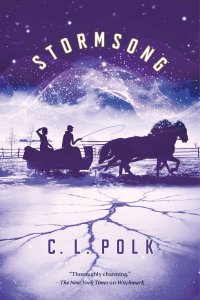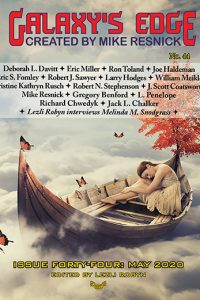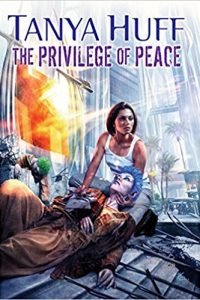Katharine Coldiron and Liz Bourke Review Stormsong by C.L. Polk
 Stormsong, C.L. Polk (Tor.com Publishing 978-0-76539-899-4, $17.99, 352pp, tp) February 2020.
Stormsong, C.L. Polk (Tor.com Publishing 978-0-76539-899-4, $17.99, 352pp, tp) February 2020.
Witchmark was one of 2018’s critical darlings in genre fiction. Its sequel, Stormsong, has been highly anticipated by readers and reviewers alike, and I believe they will be satisfied. Although the book reads a little predictably, and attaches to its predecessor strongly enough to be difficult to understand at first, it’s a marvelously readable novel set in a fun world, mixing and matching elements from a variety of subgenres.
C.L. Polk elects to switch narrators, telling Stormsong through Grace, sister to Witchmark‘s narrator Miles. The story follows Grace’s attempts to hold her country together through a crisis of several dimensions. The nation’s equivalent of electric power no longer works, snowstorms of unbelievable strength threaten the city, and journalists are starting to discover the unspeakable events of Witchmark. As the new Chancellor, Grace must balance many competing interests on the head of a pin, and in the meantime she’s falling recklessly in love with one of those dirt-digging journalists. Will she succeed in revealing the ugly truth of her nation’s crimes without inciting riots? Will she free Aeland’s witches from prison and exile without losing her political position? Will she figure out who killed a diplomat on her watch?
Grace has a lot of power, both political and magical. As a narrator, she’s engaging and sympathetic without being terribly distinct, which for many readers will be just right. Her actions often try to split the difference between democratic instincts (in a monarchy) and the long training she’s received at the hands of her callous, manipulative father. Walking the middle way like this makes for compelling conflict, but it also makes Grace seem overly conciliatory and a little bit cowardly. I detail this because the book’s parallels to our current political situation are unignorable: a climate crisis, a selfish national leader, a wealthy ruling class disconnected from day-to-day realities, and concentration of power among nepotistic relationships. In light of these parallels, Grace’s reluctance to choose a side feels less sympathetic. “Change is slow,” Grace tries to tell an oppressed witch. “When you set a goal, you can’t just grab for the end results. It’s a journey of small victories.” Exactly what civil rights leaders of all stripes have been told for centuries.
Despite this heavy business running along below, the fantasy elements above are delightful. This universe, with various strains of magical powers next to gaslights and bobbed hair, as well as the unearthly Amaranthines (a race? a pantheon?), is unique enough to be entertaining and familiar enough not to be mystifying. Stormsong blends more than just fantasy elements; the book also includes a full-fledged mystery, with red herrings and false leads aplenty, as well as a whole lot of queer romance. It’s an active, churning book, packed with dialogue and scenes, hardly stopping for a moment. The end result is a cracking read, if not a perfect book.
One of its virtues is Grace’s inner journey. Along with leading her nation to a better compromise between use and oppression of magic, she must find her own path between training and instincts. “All of you make me want to be better,” she tells her paramour, Avia Jessup, who has turned away from her own rich family. “All of you know exactly who you are, even if it’s not what you’re supposed to be.” Later, as she weighs a decision to step higher up in her old life or leave it behind: “The person I was when I was with my brother, Avia, Tristan…that woman would never become anything. I didn’t know who she was, but I would never learn [this way].” She faces choices in every chapter of the novel, and although few of them elicit real tension in an experienced reader (no, of course she’s not going to obey her terrible father; yes, of course she’s going to undermine a greedy monarch), there are so many that we feel Grace’s fatigue and the weight of her troubles keenly.
The biggest problem with Stormsong is its dependence on Witchmark. I read at least the first 50 pages without understanding much of what was going on. Presumably the worldbuilding in Witchmark was solid enough to launch Stormsong directly where the prior book left off, and I’ll wager that the third book in the series will do the same. Stormsong ends immediately before a gathering of witches and mages to ward off a big storm, which would have been a great set piece to end this installment, but is likely going to open the next.
That next book will be just as fine an addition to fantasy literature as Stormsong is. Polk has assembled a compelling political context and a winning combination of elements on which to stage character dramas. Many avid readers look forward to finding out who she taps next for the central spot.
–Katharine Coldiron
This review and more like it in the March 2020 issue of Locus.
C.L. Polk’s debut novel, World Fantasy Award winner Witchmark, was a novel about family and romance, secrets and atrocities, power and betrayal and love and loyalty. Miles Hensley helped save the day (undo a horrible atrocity) and got the (handsome, powerful, otherworldly) guy. Now, in eagerly awaited sequel Stormsong, his sister Dame Grace Hensley has to deal with the consequences.
And damn are there a lot of consequences. It’s the middle of winter, and undoing an atrocity of longstanding means the power is out in Aeland. Massive storms are brewing offshore. The otherworldly Amaranthines have a bone to pick with Aeland. Aeland’s colonialist foreign policy is falling apart and the consequences are coming home to roost. Grace’s imprisoned father (former Chancellor of the government) and his cabal of mages are still convinced that the right thing is the thing that benefited them most, and elder Hensley is still pulling strings from his (comfortable) prison cell. The secrets and lies that Aelander society is built on are going to come out, and it’s not going to be pretty when they do. And the Queen of Aeland is hostile to the slightest suggestion of reform.
Grace, appointed Chancellor as part of her bid to fix things – and as part of a power-struggle between Queen Constantina and her heir, Price Severin – finds herself wrestling with personal, social, and moral consequences. Grace is an ambitious woman, confident in her own capabilities (and largely not far wrong in her self-assessment); one who was, moreover, raised with the idea of power and wealth as her birthright. She’s also a woman with a conscience, and now she’s faced with a series of difficult choices. How many compromises can she (or even, should she) make before she has given up the power to make necessary changes, in favour of the shallower power of being a figurehead for the status quo? She faces this question not only as the Queen’s representative in parliament, but as the putative leader of the group of socially sanctioned mages (all from families of great influence) that Aeland relies on to reduce the strength of the storms.
Grace has to wrestle with a lot of people asking her uncomfortable questions and pointing out the ways in which her actions fall short of doing the right thing, all the while trying to find a path forward that doesn’t result in disaster either for her country or for her, personally. One of those people asking questions is photojournalist and reporter Avia Jessup, a woman to whom Grace can’t help feeling attracted. Avia’s investigation puts her at risk of a charge of treason from those that want to maintain the status quo, and she and Grace can’t quite trust each other because they have competing priorities.
People get arrested. Unfair and unjust systems are confronted. Uncomfortable – and at times downright horrific – truths are voiced aloud to people in power. And Grace has to come to terms with the differences between the instincts of her upbringing, and the person she wants to be.
Polk writes a tense, compelling novel focused on aftermaths and the consequences of disrupting existing power structures – even when those structures need to be challenged, the results aren’t clean-cut. As in Witchmark, it’s Polk’s talent for character that makes her work shine. Grace is a very different character than Miles, but she’s just as compelling – maybe even more so. Grace is a political operator, an ambitious woman who isn’t ashamed of her ambition, and who has a strong sense of her own capabilities. We rarely see this kind of character portrayed in science fiction and fantasy – a politically ambitious woman whose mistakes and learning curve don’t make her less competent, and whose ambition is supported rather than derided by the narrative. Her relationship with Avia develops in tandem with other, more political, entanglements, and Polk’s deft hand with romance makes it instantly believable – and makes us care for its success.
Though Stormsong has – delightfully queer – romantic elements, it would be misguided to characterise it as a romance, as I’ve seen some people do. It’s a political thriller set in a city with the potential for (justified) revolution, with multiple factions all with their own agendas, and at least one politically inconvenient murder that Grace needs to solve – or face disastrous consequences.
It’s a powerful novel, with a lot to say. I found it a strikingly effective, compelling, and deeply enjoyable read. Even if you haven’t read Witchmark, I’d recommend you give it a try: it succeeds in being a strong read without much prior knowledge of its predecessor.
It’s a damn good book.
–Liz Bourke
This review and more like it in the April 2020 issue of Locus.
Katharine Coldiron is the author of Ceremonials (Kernpunkt Press), an SPD fiction bestseller. Her work as a book critic has appeared in The Washington Post, The Believer, The Guardian, and many other places. She lives in California and at kcoldiron.com.
Liz Bourke is a cranky queer person who reads books. She holds a Ph.D in Classics from Trinity College, Dublin. Her first book, Sleeping With Monsters, a collection of reviews and criticism, is out now from Aqueduct Press. Find her at her blog, her Patreon, or Twitter. She supports the work of the Irish Refugee Council and the Abortion Rights Campaign.
 While you are here, please take a moment to support Locus with a one-time or recurring donation. We rely on reader donations to keep the magazine and site going, and would like to keep the site paywall free, but WE NEED YOUR FINANCIAL SUPPORT to continue quality coverage of the science fiction and fantasy field.
While you are here, please take a moment to support Locus with a one-time or recurring donation. We rely on reader donations to keep the magazine and site going, and would like to keep the site paywall free, but WE NEED YOUR FINANCIAL SUPPORT to continue quality coverage of the science fiction and fantasy field.





